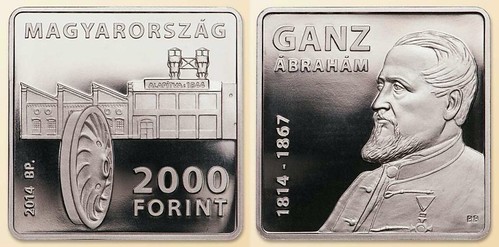
PREV ARTICLE
NEXT ARTICLE
FULL ISSUE
PREV FULL ISSUE
SOME RECENT COIN DESIGNS: JANUARY 11, 2015Pabitra Saha continually scours the web for information on new coins. Here are a few recent designs that caught my eye.
-Editor
Hungary 2000 Forint Coin on Abraham Ganz Bicentenary
 You don't see too many square coins. I think the square format works pretty well for this design. -Editor
Ukraine Coin on Ozbek Han Mosque and Madrasa

 The unusual crescent region makes for an interesting design. I'm not sure I've ever seen a coin quite like this, and I like
it. Can anyone show us another coin with a similar arrangement? -Editor
Ukraine Coin on Vasyl Lipkivskiy
 Here's another Ukrainian coin, but I don't like this one a bit. It's ugly, and portrait is frightening. -Editor
Finland Coin on Jean Sibelius
  I found more information on this one online. I didn't like this design so much. I couldn't make out what the obverse
represented, and (like an idiot) I thought the reverse showed the neck of a guitar. Having read the explanation of the design I'm OK with it, but
it didn't "grab" me. -Editor
The Jean Sibelius collector coin represents Finnishness at its most profound. It is a beautiful and touching gift with a place in the home of any Finnish person or music lover of any nationality. The collector coin's obverse depicts the starry sky of Ainola and a copse of pine trees, among which Sibelius was often seen lost in thought. The reverse bears the neck of a violin, the composer's favoured instrument. The collector coin struck in honour of the 150th anniversary year of Jean Sibelius (1865–1957) commemorates the master composer's remarkable oeuvre and influence on the Finnish national character and Finnish classical music. The Sibelius collector coin touches every Finn and represents a piece of Finnishness to people of other nationalities. To read the complete article, see:
Ireland Coin on Ernest Walton
 Ireland will issue a 15 Euro coin in honour of its Nobel Prize winner, Ernest Walton. Walton, with John Douglas Cockcroft, shared the 1951 Nobel Prize in Physics for their pioneering work on the transmutation of a nucleus by artificially accelerated atomic particles. The design on the coin gives an artist’s impression and explanation to the equation we all know, E=mc2. I'm partial to science-related themes. I'm so sure this one succeeds, but I'll give it points for trying to explain a
complicated subject in a simple coin design. -Editor
THE BOOK BAZARREWayne Homren, Editor The Numismatic Bibliomania Society is a non-profit organization promoting numismatic literature. See our web site at coinbooks.org. To submit items for publication in The E-Sylum, write to the Editor at this address: whomren@gmail.com To subscribe go to: https://my.binhost.com/lists/listinfo/esylum All Rights Reserved. NBS Home Page Contact the NBS webmaster 
|